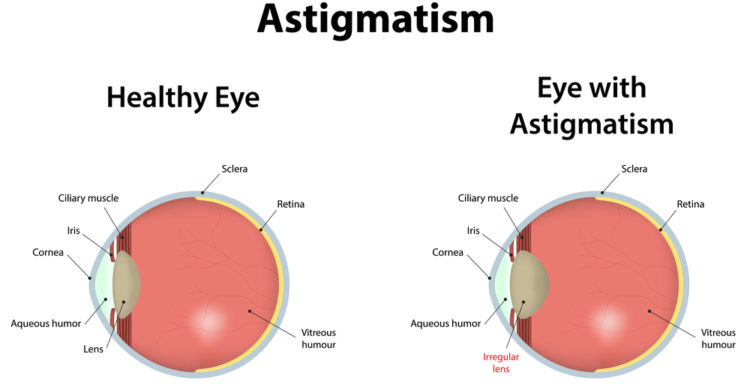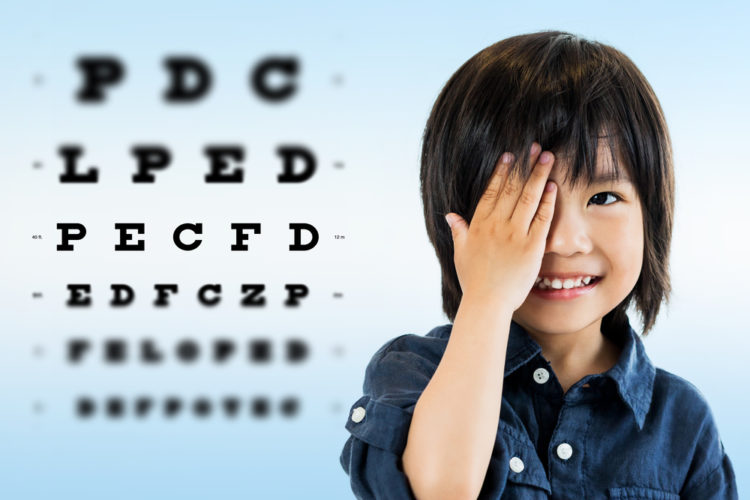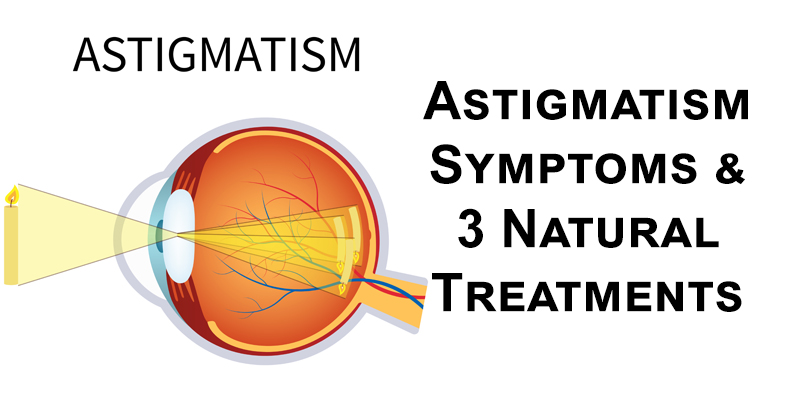While astigmatism is common, there are natural treatments available. This condition is a vision problem that affects children and adults alike. Astigmatism alters the shape of the lens in the eye; the surface of an astigmatic lens is egg shaped. A normal lens, on the other hand, has an even surface, like that of a round ball. This aberration in curvature causes blurred vision at all distances. (1) The good news is that astigmatism natural treatments are available to address and relieve astigmatism symptoms, including several astigmatism natural remedies that will also help. Let’s look at the symptoms of astigmatism and how to reduce astigmatism naturally.

Astigmatism is often present at birth and may occur in combination with nearsightedness or farsightedness, however, it is often not pronounced enough to require corrective action. (2)
Astigmatism Symptoms
- Blurred or distorted vision
- Eyestrain or discomfort
- Headaches
- Difficulty with night vision
- Squinting (3)
Astigmatism Natural Treatments
1. Early Detection
Children should undergo an eye exam and visual acuity test administered by their pediatrician or family doctor around age 3½. In addition, vision and eye alignment should be checked around age five. Those who fail either test should be examined by an eye doctor. After age five, routine screenings should be done at school and at the primary doctor’s office. (4) If you see any signs of vision problems in your child, be sure to take them to the doctor for an examination. These signs may include any of the symptoms listed above, such as squinting or headaches.

2. Corrective Lenses
The simplest and safest way to correct astigmatism symptoms is with prescription eyeglasses. Contact lenses also work by becoming the first refractive surface for light rays entering the eye, causing a more precise focus. (5) Speak to your eye doctor as soon as possible about a prescription that will work for you.
3. Natural Remedies and Methods of Prevention
Astigmatism natural remedies include practices that will help improve astigmatism symptoms, as well as overall eye health. This also entails carrying out preventative measures.
Maintain a healthy weight. Weight gain and obesity contribute to diabetes and other chronic health conditions that can lead to vision loss. Try to focus on consuming as many antioxidant-rich foods as possible, including organic fruits and vegetables. Also be sure to get plenty of exercise to help maintain a healthy lifestyle. For more on eye-healthy foods you should be eating, read the segment below.
Wear protective eye wear. Wear protective eye wear when playing sports or doing activities around the home. Eye protection will protect your eyes from foreign objects.
Quit smoking or never start. Smoking is terrible for your eyes, not to mention the rest of your body. There are patches and gums available to help you quit. However, many people find these methods don’t work You can go cold-turkey, as well. Alternatively, there are natural methods available to help you give up cigarettes. Whichever method you choose, just quit smoking.
Be cool and wear your shades. Look for sunglasses that block out 99 to 100 percent of both UV-A and UV-B radiation.
Give your eyes a rest. We sometimes forget to blink. This is especially true if we spend a lot of time on the computer or focus too long on work. This leads to fatigued and dry eyes. Try the 20-20-20 rule: Every 20 minutes, look away about 20 feet in front of you for 20 seconds. This can help reduce eyestrain. (6) Of course, we all lead busy lives. As such, it can be easy to forget to stop to blink. If this describes you, try setting an alert or alarm on your phone to help you to remember.

Improve Your Diet
A lot of prevention of diseases and conditions starts with what you eat. As Hippocrates said, “let food be thy medicine.” There is so much healing to be found in the food we’re meant to eat! And, to be sure, a diet rich in fruits and vegetables is an essential component in your toolkit of astigmatism natural remedies, particularly dark leafy greens such as spinach, kale, or collard greens. As such, you should add nutrients to your daily diet. Achieve this either through foods or supplements to help preserve your vision and reduce the risk of certain eye diseases.
1. Lutein and Zeaxanthin
Lutein and zeaxanthin These are important nutrients for the eyes. You can find them green leafy vegetables. Try spinach, romaine lettuce, kale, or chard, for example. These all taste great in a green salad, mixed in with other colorful vegetables or fruits. Studies show that lutein and zeaxanthin reduce the risk of chronic eye diseases.
2. Vitamin C
Vitamin C (ascorbic acid) is an antioxidant you can find in fruits and vegetables. Scientific evidence suggests vitamin C, when taken in combination with other essential nutrients, can slow the progression of visual acuity loss. Try strawberries, oranges, mangoes, or green bell peppers
3. Vitamin E
Vitamin E is a powerful antioxidant found in nuts, fortified cereals and sweet potatoes; moreover, research indicates it protects cells in the eyes from unstable molecules called free radicals, which break down healthy tissue
4. Essential Fatty Acids
Essential fatty acids are a necessary part of the human diet. They maintain the integrity of the nervous system, fuel cell growth and boost the immune system. Furthermore, research shows omega-3 fatty acids are important for proper visual development and retinal function. Walnuts and flaxseeds are great examples of healthy foods high in essential fatty acids
5. Zinc
Zinc is an essential trace mineral or “helper molecule.” It plays a vital role in bringing vitamin A from the liver to the retina in order to produce melanin, a protective pigment in the eyes. (7) Try legumes, nuts, or seeds; all of these are good sources of zinc.
Conclusion
It is easy to control astigmatism with healthy life habits. Detection, prevention & treatment are the three steps needed to keep your eye health for your entire life. A healthy lifestyle coupled with proper nutrition, is not only important for overall health but also critical to the health of your eyes. If you suffer from any of the symptoms listed, have your vision checked. Who knows, you might look really good in glasses!


